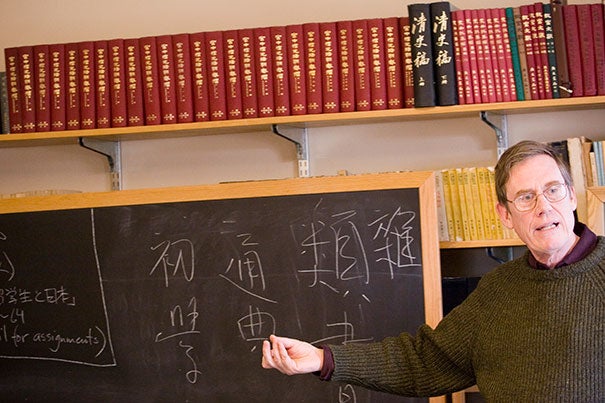
Historian and humanities scholar Peter K. Bol has been named vice provost for advances in learning. In his new role, Bol will oversee both HarvardX and HILT.
File photo by Stephanie Mitchell/Harvard Staff Photographer
A boost for new ways to learn
Harvard names Peter Bol as vice provost for advances in learning
Harvard University Provost Alan Garber announced today the appointment of historian and humanities scholar Peter K. Bol as vice provost for advances in learning. Bol, the Charles H. Carswell Professor of East Asian Languages and Civilizations, will oversee the University’s longstanding and expanding efforts to support faculty experimentation in novel pedagogies, research on learning sciences, and the use of technologies and tools to enhance teaching and learning on campus and online.
“With the creation of the Harvard Initiative for Learning and Teaching (HILT) in October 2011 and the launch of edX and HarvardX in May 2012, it has become clear that the University’s work in these areas have reached a level that warrants dedicated academic leadership,” said Garber. “Peter’s stellar teaching, experience with technology, and broad understanding of Harvard’s culture and community make him the ideal choice to ensure that our efforts in advancing learning, both on campus and online, are well-coordinated, strategic, and effective. He will be a staunch ally for the faculty, always listening and learning as we pursue both innovation and excellence in our teaching.”
Bol’s appointment comes at a critical and exciting time for Harvard and higher education. As President Drew Faust remarked in her opening-year address, this is an era when “new understandings of human behavior and the brain, along with advances in technology, have opened the door to remarkable new possibilities for teaching and learning, both face-to-face and online.”
An expert on the history of China’s cultural elites at the national and local levels from the seventh to the 17th centuries, Bol has long been a pioneer in considering and actualizing such technological and pedagogical experimentation. He has served as the chairman of the Harvard Academic Computing Committee, led the University-wide effort to integrate geospatial analysis in teaching and research, and developed one of the initial HarvardX online courses, SW12x, “China” (a course being offered concurrently at the College and at the Extension School).
In his new role, Bol will report directly to the provost and oversee both HarvardX and HILT. Working with faculty and deans from across the University, his broader charge is to guide and develop Harvard’s strategies for advancing pedagogy and enhancing the residential educational experience.
“Peter balances the ineffable magic of teaching with the power of technology,” said Michael D. Smith, dean of the Faculty of Arts and Sciences. “His innovative teaching enriches our College courses. He has an amazing ability to help students gain a deeper historical perspective by tapping into Harvard’s unique museum and library collections, as well as our new digital resources. Deftly and dynamically, Peter elevates knowledge without ever overwhelming students.”
Bol expects to further conversations about innovations in teaching and learning and their implications for Harvard and the world. The constantly changing technical landscape in higher education — from social media to Web-based tools to learning management systems — and the desire of Harvard faculty to enhance the student experience present tremendous opportunities for exploration and experimentation.
“Peter’s new role will help us all advance the University’s priority to be a leader in teaching and learning,” said Erin Driver-Linn, associate provost for institutional research and director of HILT. “HILT’s activities have catalyzed innovation and excellence in learning and teaching, and fostered a growing community of pioneering faculty, staff, students, and researchers at Harvard. Peter’s ability to connect across scholarly and organizational boundaries will help us take these activities to another level of integration and dynamic possibilities.”
In particular, educational researchers such as Andrew Ho, associate professor of education and research chair of HarvardX, are eager to gain insights into how students learn online and to discover ways to improve student learning in residential settings. The wealth of new data generated from online learning efforts allows faculty to evaluate curricula, grading, and feedback strategies, as well as interventions to improve course completion rates.
“I couldn’t be more thrilled with Peter’s appointment,” said Robert Lue, professor of the practice of molecular and cellular biology, faculty director of HarvardX, and Richard L. Menschel Faculty Director of the Derek Bok Center for Teaching and Learning. “He will bring things together in a profound way. While scholarly research has long enjoyed shared facilities and tools and close communities of best practice, until now, teaching at Harvard has not formally been supported in such an integrated way. A flexible and networked infrastructure for learning led by Peter will be a powerful means for faculty to put even the wildest ideas to the test.”
Through recent, University-wide endeavors such as HILT and HarvardX, Bol plans to work with the Schools to develop policies and best practices and foster closer collaboration with the Harvard Library, the museums, the Division of Continuing Education, and Harvard University Information Technology, as well as teaching and learning hubs such as the Bok Center. He used the University’s extensive collection of Chinese artifacts, for example, to help bring his online and campus course on Chinese history to life.
“It is an honor to further the work of Erin Driver-Linn and HILT, Rob Lue and HarvardX, and Andrew Ho’s research group,” said Bol. “The HILT program has shown us how much learning and teaching matter to all of us across the University. HarvardX has given us an opportunity to develop new methods of engaging students at Harvard in learning and sharing knowledge with the world. We look forward to the research that will help us understand the implications these efforts at Harvard and elsewhere hold for the future of education.”




